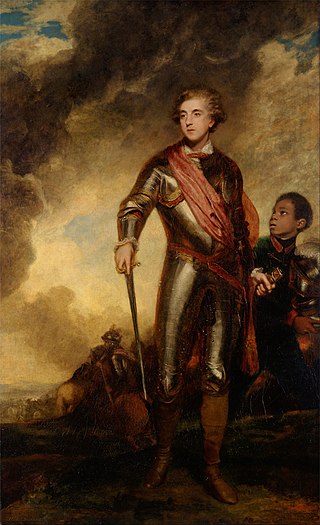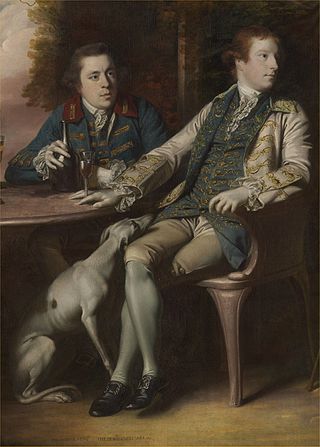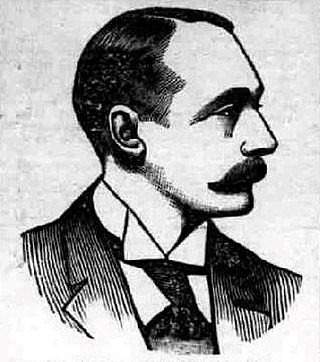Related Research Articles

Earl of Chesterfield, in the County of Derby, was a title in the Peerage of England. It was created in 1628 for Philip Stanhope, 1st Baron Stanhope. He had been created Baron Stanhope, of Shelford in the County of Nottingham, in 1616, also in the Peerage of England. Stanhope's youngest son, the Hon. Alexander Stanhope, was the father of James Stanhope, 1st Earl Stanhope, while his half-brother Sir John Stanhope of Elvaston was the great-grandfather of William Stanhope, 1st Earl of Harrington.
Earl of Harrington is a title in the Peerage of Great Britain that was created in 1742.

General Charles Stanhope, 3rd Earl of Harrington, styled Viscount Petersham until 1779, was a British Army officer and politician who sat in the House of Commons between 1774 and 1779 when he succeeded to the peerage as Earl of Harrington.
Philip Stanhope, 1st Earl of Chesterfield was an English nobleman, aristocrat and royalist, who was created the first Earl of Chesterfield by King Charles I in 1628.
George Feilding, 1st Earl of Desmond was an English aristocrat, awarded the title of Earl of Desmond in the Peerage of Ireland by Charles I of England under the terms of a letter patent issued by James I of England.

General William Stanhope, 2nd Earl of Harrington was a British politician and soldier.

Sir Reginald Hanson, 1st Baronet, JP, DL, FSA was Lord Mayor of London and a British Conservative Party politician.
William Alington, 1st Baron Alington of Killard was an Irish peer, the son of Sir Giles Alington. He was created 1st Baron Alington of Killard, on 28 July 1642.

Charles Hare Hemphill, 1st Baron Hemphill, PC QC, was an Irish politician and barrister.
Arthur Stanhope was an English politician who sat in the House of Commons between 1660 and 1679.

Henry Fane was a British politician who sat in the House of Commons for 30 years between 1772 and 1802.
Baron Stanhope, of Harrington in the County of Northampton, was a title in the Peerage of England. It was created on 2 May 1605 for Sir John Stanhope, who served as Vice-Chamberlain of the Household between 1602 and 1616. He was the son of Sir Michael Stanhope and the brother of Sir Thomas Stanhope, ancestor of the Earls of Chesterfield, the Earls of Harrington and the Earls Stanhope.

John Stanhope, 1st Baron Stanhope was an English courtier, politician and peer.
Sir Walter Thomas William Spencer-Stanhope was a British Conservative politician and Volunteer officer.

Sir Charles Glynne Earle Welby, 5th Baronet, was a British civil servant who became a Conservative Party politician. He sat in the House of Commons from 1900 to 1906, and then had a long career in local government in Lincolnshire.
Sir Glynne Earle Welby-Gregory, 3rd Baronet, born Glynne Earle Welby, was a British Tory Member of Parliament.
The Golden Jubilee Honours for the British Empire were announced on 21 June 1887 to celebrate the Golden Jubilee of Queen Victoria on 20 June 1887.
The Royal Households of the United Kingdom consists of royal officials and the supporting staff of the British Royal Family, as well as the Royal Household which supports the Sovereign. Each member of the Royal Family who undertakes public duties has his own separate Household.

The 1838 Coronation Honours were appointments by Queen Victoria to various orders and honours on the occasion of her coronation on 28 June 1838. The honours were published in The London Gazette on 20 July and 24 July 1838.

The 1831 Coronation Honours were appointments by King William IV to various orders and honours on the occasion of his coronation on 8 September 1831. The honours were published in The London Gazette on 16 September and 27 September 1831.
References
- "thePeerage.com" . Retrieved 3 February 2007.
- Leigh Rayment's Peerage Pages [ self-published source ][ better source needed ]